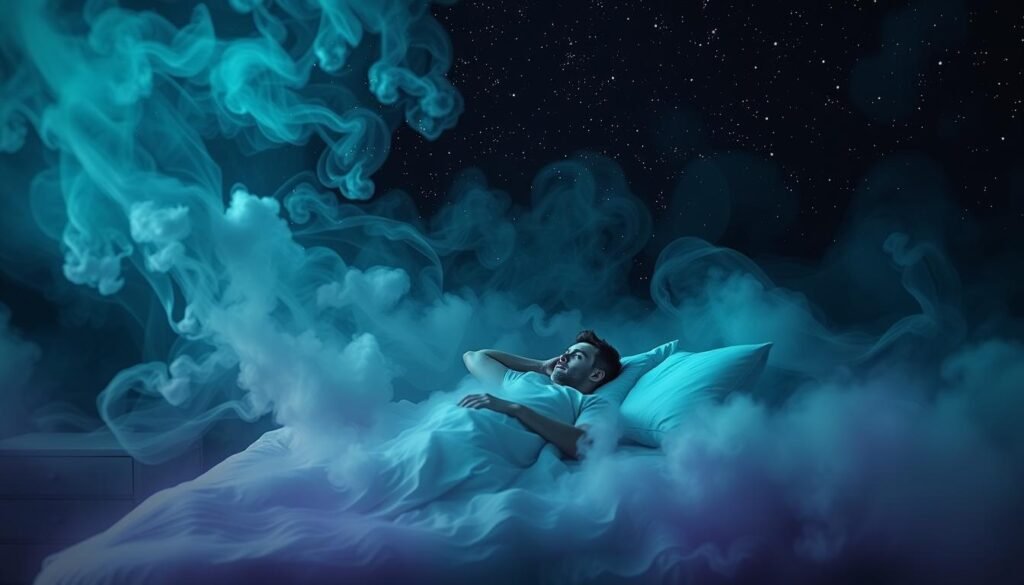A study at the University of Colorado Boulder shows a strong connection between regular cannabis use and sleep problems. This research found both early and late sleep disturbances. It challenges the idea that cannabis always helps with sleep. As more people use cannabis to deal with sleep issues, it’s important to look at if THC can cause insomnia or other sleep problems.
Cannabis is becoming more popular for those having trouble sleeping. But its true effect on sleep quality is in question. Some say cannabis helps them sleep, but heavy use might lead to less sleep and longer time to fall asleep. We need to ask: does THC cause insomnia? Knowing how THC affects sleep is key for those using cannabis to fix their sleep issues.
Key Takeaways
- Research links frequent cannabis use with early and late sleep problems.
- Heavy chronic use of THC is associated with insomnia and lower sleep duration.
- High doses of THC may obstruct sleep, while CBD can enhance sleep quality.
- Cannabis-induced insomnia can occur with long-term usage.
- Identifying symptoms of cannabis-induced sleep issues is essential for effective management.
Introduction to THC and Sleep
Delta-9 tetrahydrocannabinol (THC) is the main psychoactive compound in cannabis. It’s known for helping with relaxation and sleep. People look into THC sleep aid options when normal medicines don’t work well.
Studies show that THC can change sleep patterns for the better. It can make it easier to fall asleep and improve the quality of sleep. Still, we need to think about the long-term effects of THC on sleep quality and safety.
THC offers some therapeutic benefits, but it also affects overall health. About 71% of patients using medical cannabis saw better sleep. Yet, about 21% faced negative side effects. The effects of THC vary with the dose, which means one must be careful to get the desired outcome.
Using cannabis as a sleep aid invites more research into how it works. It could help with anxiety, chronic pain, and sleep issues. This could offer a way out of sleep deprivation cycles. So, studying THC’s therapeutic value more will help us understand it better.
For tips on handling anxiety caused by chronic sleep issues, check this useful resource.
The Growing Use of Cannabis for Sleep Disorders
More and more people use cannabis to treat sleep issues today. Over 24 states in the U.S. now allow recreational cannabis. This shows a growing acceptance of its possible benefits. Surveys reveal that up to half of those using medical cannabis do so for insomnia. While it may help some sleep better, the effects of cannabis are complicated.
About 21% of users say cannabis products improve their sleep. However, 48% report worse sleep, and 14% have mixed results. Another 17% see no change at all. These numbers show how people react differently to using cannabis for sleep problems. The debate continues over whether cannabis can truly improve sleep quality for those with insomnia.
But we must be careful with using cannabis for sleep. Big studies suggest it might cause more wake-ups at night. Long-term use could even affect the brain, especially in young people. How you consume cannabis—smoking, vaping, or eating THC foods—changes its effects. Knowing this can help people make better choices.
Talking to a doctor about using cannabis for sleep is very important. They can look at your health history and talk about the pros and cons. With more people interested in cannabis for sleep, we need more studies. This will help us understand how safe and effective it is for sleep disorders.
Understanding Sleep Quality and Its Importance
Sleep quality is crucial for our health and emotional well-being. It involves how long we sleep, how deep, and our sleep cycles. Knowing about these can help us see why poor sleep harms us. For example, bad sleep can make us struggle with thinking clearly, feeling stable, and performing daily tasks.
Research finds that over one-third of U.S. adults don’t get enough sleep. They miss the recommended seven hours per night. This lack of sleep is due to lifestyle, mental health, and substances like cannabis. A report shows 14.5% of U.S. adults use marijuana, sparking debates on its sleep effects.
Although some use cannabis to fight sleep problems, it could backfire. Long-term use might lead to addiction and worse sleep issues. A study noted that using cannabis often links to poor sleep quality. It’s important for everyone to think carefully before using such aids for sleep.
Understanding our sleep patterns is key to staying healthy. If you’re thinking about using cannabis for sleep, talk to a doctor first. They can help you make the best choice for your sleep health. For extra details on cannabis and sleep, check out this resource.
| Aspect | Significance | Potential Impact |
|---|---|---|
| Duration | Refers to the total amount of sleep one gets | Insufficient duration can lead to sleep disorders |
| Depth | Reflects the restorative phases of sleep | Poor depth can negatively impact physical health |
| Sleep Cycles | Includes stages like REM and deep sleep | Disruptions can result in cognitive impairment and mood swings |
Does THC Cause Insomnia?
The link between THC and sleep is not straightforward. Some wonder if THC leads to insomnia after they stop using it. Some studies indicate THC might help people fall asleep quicker. However, long-term use may change sleep patterns. It especially affects REM sleep and increases lighter stages of sleep.

The Effects of THC on Sleep Patterns
THC’s impact on sleep is complicated and varies. Some research shows THC can make falling asleep easier. But, it often reduces REM sleep. This can affect memory and make you feel tired during the day. People react differently to THC, and heavy use might disrupt normal sleep.
Cannabis Withdrawal and Sleep Disruption
Stopping cannabis use suddenly can make insomnia worse for some. Many have trouble sleeping during withdrawal. In fact, up to 76% of people quitting THC experience sleep issues. This highlights concerns about dependence and sleep quality. Stopping use can lead to major sleep problems.
To improve sleep quality, consider new strategies. Regular sleep routines and relaxation techniques can help. For more tips on fighting insomnia and better sleep, check out this link: Understanding insomnia causes and solutions.
How THC Affects REM Sleep
THC changes how long we spend in REM sleep. This sleep phase is key for remembering and managing emotions.
The Role of REM Sleep in Overall Health
REM sleep keeps our minds sharp. It helps us handle emotions and remember things better. Lack of REM can harm our mental health, showing its importance for good sleep.
Consequences of Reduced REM Sleep
Using THC can cut down REM sleep. This might cause problems with memory, more anxiety, and more depression. It’s important to balance THC and healthy sleep, especially for those using it to relax or sleep better.
| Aspect | Normal REM Sleep | With THC Use |
|---|---|---|
| Duration | Approximately 20-25% of total sleep | Reduced duration |
| Cognitive Function | Improved memory and learning | Potential decline in memory retention |
| Emotional Regulation | Supports emotional stability | Increased anxiety and depression risk |
| Overall Sleep Quality | Balanced sleep architecture | Altered sleep stages with more deep sleep |
The Relationship Between THC and Anxiety
THC and anxiety have a complex link that affects sleep and well-being. Some people use THC to ease their anxiety. However, for others, regular use may make anxiety worse. This can also make sleeping well harder. Knowing how THC and anxiety interact is key for anyone looking at cannabis for anxiety.
Impact of Anxiety on Sleep Quality
Anxiety and sleep problems often go hand in hand, worsening conditions like insomnia. A study found that nearly 90% of those with anxiety disorders also suffer from insomnia. This shows how common sleep troubles are in people with anxiety. It also points out how vital good sleep is for controlling anxiety.
Cannabis might disrupt sleep for some, making it hard to fall or stay asleep. This creates a cycle of anxiety hurting sleep, which then increases anxiety further. This can also raise concerns about THC and insomnia. So, it’s important for anyone using THC to know how it might affect their sleep and anxiety.

Long-term Effects of THC on Sleep
THC’s impact on sleep varies with different usage habits. Studies suggest that long-term use of THC affects sleep differently for occasional and regular users. While frequent users may see more sleep issues, less frequent users might not have the same problems.
Comparing Occasional vs. Regular Use of THC
A recent study found that 14 percent of people used cannabis last month. Among them, 56 percent said they slept too much. And 34 percent felt they didn’t get enough sleep. Also, 31 percent had trouble falling or staying asleep, or oversleeping.
In a study comparing sleep quality, big differences were seen between occasional and regular users. Those using THC for 20 days or more were 64 percent more likely to have sleep problems. They were also 76 percent more likely to oversleep. Yet, even less frequent users reported 47 percent more oversleeping issues.
Small amounts of THC may slightly reduce REM sleep. But, higher doses can greatly decrease both REM and deep sleep. This doesn’t change how long you sleep. Regular use could mess up your natural sleep cycle. And it might make you depend on cannabis to sleep.
Stopping heavy use of cannabis can really affect your sleep quality. This shows how crucial it is to know the long-term effects THC has on sleep. It helps in making wise decisions about using cannabis.
Alternatives and Natural Sleep Aids
Many people look for natural ways to improve sleep disturbances. Natural sleep aids are safer than sleep medications. They have fewer risks and side effects. Gut health is linked to sleep quality, so probiotics might help with insomnia by affecting the microbiome. Learning about this connection can help improve sleep patterns.
Probiotics and Gut Health in Sleep Quality
Gut health is key for good sleep and overall health. Probiotics can help with insomnia. About 20% of adults face insomnia occasionally. Adding probiotics to daily routines might ease some of these issues. This could make sleep better. Also, changes in lifestyle and therapies that focus on sleep and mood can boost sleep quality. This is important for those with chronic insomnia linked to mental health.
Other Natural Insomnia Remedies
There are many natural remedies for insomnia besides probiotics. Valerian root and melatonin are key for sleep. Valerian root is used in doses between 300 and 600 mg to boost sleep quality. Melatonin helps those with sleep cycle issues. Other options include:
- Magnesium supplements to help you fall asleep faster.
- Lavender aroma therapy for better sleep quality.
- Passionflower tea to sleep longer and wake up less.
- Meditation and progressive muscle relaxation for relaxation.
- Acupuncture, which could help with insomnia.
Looking into natural sleep aids can help manage insomnia. For more info, check natural sleep aids.

Current Research and Findings
Research in cannabis and sleep is still growing. It shows important trends and issues. Studies aim to figure out how THC affects sleep. They look at how it might change sleep quality. But, as more people use cannabis for fun or health, it’s hard to make solid conclusions.
Limitations of Existing Studies on Cannabis and Sleep
Today’s cannabis research faces big challenges. Many studies depend on what people say about their sleep, which can be biased. This makes it tough to accurately track sleep changes due to THC.
- Small study groups might not reflect everyone.
- There’s a need for more long-term studies.
- Different ways of using cannabis give mixed results.
THC and sleep studies have mixed results. Some find it helps sleep, while others link it to more insomnia in heavy users. Many cannabis users also report side effects. This makes it hard to truly understand THC’s effect on sleep.
We need more detailed studies to really know if cannabis helps with sleep. Improving our understanding could help treat sleep problems better in the future. With more research, we can get clearer answers.
Conclusion
The conclusion about THC and sleep quality is quite detailed. It shows how cannabis affects sleep in different ways. Some studies show benefits like falling asleep faster.
Others mention the downsides, like less REM sleep and waking up at night, especially for heavy users. If someone uses cannabis a lot, they might find it harder to sleep without it.
Also, the long-term impact of using cannabis on sleep isn’t fully known yet. Some people say it helps with insomnia. But, stopping its use suddenly might make sleeping even harder. Genetics may also influence how cannabis affects our sleep, meaning it works differently for everyone.
There is a clear need for more research on cannabis and sleep. As laws around cannabis change, it’s vital to understand its long-term impacts on sleep. This way, people can make choices that are good for their health.